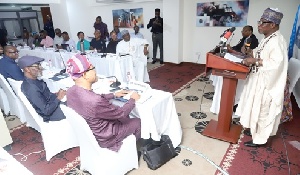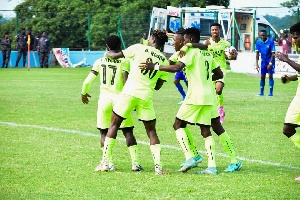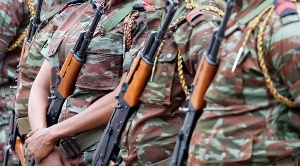- Home - News
- Elections 2024
- News Archive
- Crime & Punishment
- Politics
- Regional
- Editorial
- Health
- Ghanaians Abroad
- Tabloid
- Africa
- Religion
- Photo Archives
- Press Release
General News of Tuesday, 22 April 2025
Source: www.ghanawebbers.com
ECOWAS leaves door open for Niger, Mali, Burkina Faso to rejoin
The Economic Community of West African States (ECOWAS) has urged Mali, Burkina Faso, and Niger to rethink their decision to leave.
These three countries withdrew from ECOWAS earlier this year. They formed the "Alliance of Sahel States" (AES). If they change their minds by July 29, they can rejoin ECOWAS automatically.
At a High-Level Policy Dialogue in Accra last Tuesday, Dr. Abdel-Fatau Musah spoke on behalf of ECOWAS. He mentioned that citizens from these countries can still move freely within the region.
He also called for collaboration on security and humanitarian issues among the countries.
The event was organized by the West Africa Network for Peacebuilding (WANEP). It collaborated with the Social Science Research Council (SSRC) and the Conflict Research Network (CORN) West Africa.
This two-day event focused on “Understanding Geopolitical and Strategic Changes in West Africa.” It gathered stakeholders like representatives from ECOWAS, African Union, United Nations, and civil society organizations.
The aim was to assess current affairs and examine ECOWAS's role in conflict transformation. The discussions also aimed to address concerns of AES countries for their reintegration into ECOWAS. Ghana's Envoy to AES, Lt Colonel Larry Gbevolo-Lartey, attended the event.
In his keynote address titled “Reflections on the State of Affairs in West Africa,” Dr. Musah shared that ECOWAS appointed two Presidents for dialogue with the three countries. These Presidents are Diomaye Faye of Senegal and Faure Gnassingbe of Togo.
He pointed out governance and development deficits as major challenges facing the region.
Levinia Addae-Mensah, Executive Director of WANEP, welcomed attendees by discussing complex regional challenges. She highlighted issues like fragility, fragmentation, and violent extremism.
She stated that West Africa faces threats to peacebuilding efforts and social cohesion. The exit of Mali, Burkina Faso, and Niger from ECOWAS is a significant indicator of deep fractures in the region.
Mrs. Addae-Mensah stressed innovative responses are needed for these challenges. She emphasized understanding geopolitical changes while reimagining regional institutions' roles for a united West Africa.











